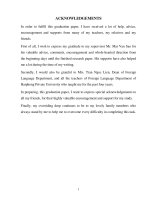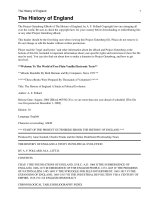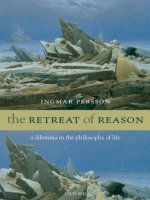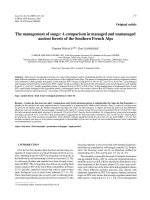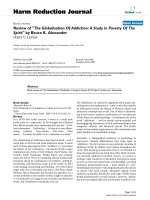Improving the learners reading skill when taking the exams of level a certified in english
Bạn đang xem bản rút gọn của tài liệu. Xem và tải ngay bản đầy đủ của tài liệu tại đây (128.33 KB, 14 trang )
PART I. INTRODUCTION
I.1. Rationale of the study
Learning English is important because it is the most common language in
the world. Almost 60% people in the world use English regularly. Learning
English is very important because it improves one’s chance of getting a good
job, helps one communicate in foreign countries, and broadens one’s social
networking. First, learning English improves the chance of getting a good job.
Companies which deal with international clients and suppliers rely on Englishspeaking employees to interpret for them with the day-to-day operations. The
requirements for the position consists the ability to speak English. Therefore,
learning English improves one’s chance of getting this position. Secondly,
people who understand English can travel much more countries by themselves
than people who do not speak English. A lot of countries are using English
aaround the world. Even if one enters countries whose main languages do not
include English, one would probably see signs such as “OK”, “Yes”, and “No.”
Understanding English helps tremendously when traveling because one can
communicate and understand better. Finally, learning English broadens one’s
social networking. For example, people who speak English have a better chance
at being accepted into training programs or colleges in English-speaking
countries. They can make friends easier if they know English. They can also
make friends all around the world just by using instant messengers online.
Knowing English broadens one’s social networking because they can
communicate with people around the world. In conclusion, learning English is
necessary today. English is the most common language in the world. Knowing
English improves one’s chance at getting a good job. One has a better chance at
getting the job than the one who doesn’t.
As young children, we first learn to read; and then around mid-elementary
school, we start reading to learn. Some children who are proficient at oral
reading can experience difficulty at this time, in terms of comprehending what
they read.
Comprehending what one reads is imperative for a child to be successful in
school. Children must be able to understand the context of the words in
individual sentences and also understand multiple concepts when reading longer
passages.
In fact, many Vietnamese students have good knowledge, they can’t use
English well
At the Nong Cong Continuing Education Center, students often have many
difficulties in reading when taking the exammination of Level A Certified in
English
1
Therefore, in this study I present some model exercises to improve the
students’ reading skill when taking the exammination of Level A Certified in
English
I.2. Aims of the study
I wish to supply some model exercises to improve the students’ reading skill
when taking the exammination of Level A Certified in English
I.3. Scope of the study
The study investigates using some model exercises to improve the students’
reading skill when taking the exammination of Level A Certified in English.
I.4. Methods
.1. Observation method
2. Survey method
3. Experimental method
I.5.New points in Innovation
When taking the exammination of Level A Certified in English at Continuing
Education Centers in Thanh Hoa province from schoolyear 2013-2014 to 20172018, the students’ reading skill has improved significantly by practising some
model reading exercises throughout techiques to teach reading
.
Deducing the meaning of unfamiliar lexical items
.
Recognizing indicators in discourse
.
Extracting salients points to summarize1
.
Using basic reference skills
.
Skimming to get general information
.
Scanning to locate specifically required information
.
Distinguising main concepts
.
Understanding application
.
Grammar referencing
.
Understand text structure
Therefore, in this study I continuously present some reference exercises to
improve the students’ reading skill when taking the exammination of Level A
Certified in English at Continuing Education Centres.
2
PART II. DEVELOPMENT
II.1. LITERATURE REVIEW
II.1.1. Why do we read?
You probably know that even in your own language reading is regarded as
important because it can be entertaining and educational, can open up new
worlds and enrich your life, and can improve hand-eye co-ordination and
enhance social skills.
But for learning a foreign language, in this case English, reading in that
language has additional important benefits that can help you learn the language
faster and more completely.
Reading is an essential skill for language learners. When your reading skills
improve, your listening, speaking and writing skills improve too. Here are some
of the specific reasons why English learners are encouraged to read in English:
The constant repetition of words and patterns in reading helps you learn
and remember vocabulary and grammar structures.
Reading helps you become familiar with the rhythm of English. Over time
it will start to feel natural and you will notice when a sentence or phrase
doesn't seem right.
Unlike conversation, reading is something you can do on your own.
Reading is not expensive, often free.
Good reading skills can improve your other language skills. You need to
learn to read before you can write.
Reading is the best way to learn and remember the proper spelling of
words.
Listening as you read along can help you improve your pronunciation
skills.
If you want to improve your English, learn to love reading in English. The best
readers often get the best grades, jobs and opportunities
II.1.2, Reading skills consist of :
- word recognition skills
-word meaning skills
- comprehensive skills
3
- study skills
- appreciation skills
II.1.3. Reading difficulty
Many of the reading problems students encounter are related to the five
components of reading (phonological and phonemic awareness, word decoding
and phonics, fluency, vocabulary, and comprehension) covered in Target the
Problem!
For some students, however, the problem may be the result of a combination of
factors – weakness in one or more of the five components and difficulty with
some form of processing. For other students, there may be a secondary
complicating problem, such as attention, memory, or the challenge of learning
English as a second language. Some additional sources of reading difficulties are
defined below. They include:
Processing
Successful reading and writing requires that a student is able to process several
types of information. Some students may have difficulty with auditory,
phonological, and/or language processing. Processing difficulties may co-exist
with other difficulties, such as dyslexia and attention deficit disorders.
Auditory processing
Auditory processing refers to a set of skills related to how the brain recognizes
and interprets information presented orally. This includes not just speech, but
also the processing of non-speech auditory stimuli like music and environmental
noise. Some people say auditory processing is "what we do with what we hear."
Humans hear sounds through the ear and then sounds are changed into electrical
information that is interpreted by the brain.
Phonological processing
Phonological processing refers specifically to the processing of speech sounds
(phonemes). Many poor readers have a specific weakness in phonological
processing even through their other processing skills (auditory and language
processing) are strong. This is often the case for students with reading
disabilities. Readers with phonological processing difficulties usually have
problems decoding words.
Language processing
4
Language processing includes a variety of language abilities including reading
and writing. It is a broader term than phonological processing. The research on
language processing clearly shows us how important it is for parents and early
caregivers to provide stimulating environments full of interesting experiences
and new vocabulary words. The daily joys of reading to and talking with babies
and toddlers do much to develop later language skills. Children with fewer
language-based experiences are typically behind their classmates when they start
school in terms of vocabulary and ability to process language. Children with a
broad language processing deficit may have problems with comprehension even
when they can decode words accurately. Children with severe language
disorders will almost certainly have difficulty reading and writing.
Memory
In order to read, children must be able to place information into their memories
and retrieve it when needed. What helps children understand vocabulary and
comprehend what they read is being able to efficiently move back and forth
between what they see in print and what is stored in their memories. There are
different types of memory, including short-term memory, working memory, and
long-term memory.
Attention
Children must be able to focus their attention in order to decode words, maintain
reading fluency, and understand what they read
II.2. REAL SITUATIONS
Many students haven’t determined the importance of English in the
current period, so they aren’t aware of their own learning.
Some students have a limited vocabulary so they can’t finish their reading
exercises when taking the exammination of Level A Certified in English
sucessfully.
II.3. RECOMMENDATIONS AND SOLUTIONS
II.3.1. RECOMMENDATIONS
According to those difficulties and real situations
I use some following model exercises to improve the students’ reading skill
5
Form 1. Read the passage and choose the best answer.
Form 2. Read the passage and decide whether the statement are True ( T )
or ( False ).
Form 3. Read the passage carefully and answer the questions below.
Form 4. Fill each of numbered blanks in the following passage.
Form 5. Arranging sequences of an event.
II.3.2. SOLUTIONS
I use some following techiques to teach reading skill when supplying the model
exercises
.
Deducing the meaning of unfamiliar lexical items
.
Recognizing indicators in discourse
.
Extracting salients points to summarize1
.
Using basic reference skills
.
Skimming to get general information
.
Scanning to locate specifically required information
.
Distinguising main concepts
.
Understanding application
.
Grammar referencing
.
Understand text structure
II.3.3: EXAMPLES
Example of using some model exercises to improve the students’ reading skill
when taking the exammination of Level A Certified in English when taking the
exammination of Level A Certified in English At the Nong Cong Continuing
Education Center
Example: Read the pasage carefully and answer the questions
One warm spring day, Mrs. Baker went to the park near her house. She sat
down on a park bench and started to read a letter from her daughter, Karen.
Karen and her husband, John and their two children, Ken and Kathy, were on
Florida on vacation for two weeks. Karen said that they were having a
6
wonderful time, and she sent some postcards in the letters. The postcards
showed pictures of Plorida.
Mrs. Baker smilled as she read the letter again. She was happy that they
were having a good time. While she was reading, a man came and sat down at
the other end of the bench. He opened his newspaper and began to read.
Suddenly the postcards blew out of Mrs. Baker's hand and fell on the
ground. They started to blow away. Mr. Marks quickly reached down and helped
Mrs. Baker pick them up.
Mrs. Baker thanked him and showed him the postcards. They introduced
themselver. It was the beginning of a very pleasant friendship.
1. Mrs. Baker was.......................................
A- At home reading her letter.
B- In the park reading her letter.
C- In the park reading her newspaper.
D- In the park reading her book.
2. Mrs. Baker was happy because..............................
A- They were having a good time.
B- They were gone.
C- She was alone.
D- She read about / of her daughter.
3. What happenned?
A- The Letter blew onto the ground.
B- The newspaper blew onto the ground.
C- The postcards blew onto the ground.
D- Her hat blew onto the ground.
4. What did Mr. Marks do?
A- He got up and went home.
B- He continued reading his newspaper.
C- He reached down and helped Mrs. Baker pick up the postcards.
D- He picked them up and looked at them.
5. After Mr. Marks helped Mrs. Baker pick up the postcards ....................
A- they went to the movie.
B- she thanked him, and then she went home.
7
C- they introduced themselves, and they began talking.
D- He continued reading his newspaper.
Suggested exercise
Exercise 1: Read this passage carefully and then choose the best answer
to questions below:
A clever old man
Mrs. Brown's grandfather lived with her and her husband. Every morning
he went for a walk in the park and came home at half past twelve for his lunch.
But one morning, a police car stopped outside Mrs Brown's house at
twelve o'clock, two policemen helped Mr.Brown to get out. One of them said to
Mrs. Brown: " The poor old gentleman lost his way in the pack and tetephoned
us for help, so we set a car to bring him home". Mrs Brown was very surprised,
but she thanked the policemen and they left.
" But grandfather", she then said, " you have been to that park nearly
everyday for twenty years. How did you lose your way there?"
The old man smiled, closed one eye and said: " I didn't quite lose my way.
I just got tired and I didn't want to walk home!"
1- What did Mrs Brown's old grandfather go to the park for?
A- For pleasure
B- For a walk
C- For amusement
C- For recreation
2- What happenned to him one morning?
A- He lost his way.
B- He was too tired to walk home
C- He came home for lunch.
D- He wanted to stay in the park.
3- How did Mrs. Brown feel?
A- Very surprised
B- Normal
C- Calm
D- Interesting
4- What did the two policemen do?
A- They received Mr. Brown's call for help.
B- They helped Mr. Brown to get out of the park.
C- They sent a car to bring him home.
D- All above are correct.
5- Which of the following statements is not true?
8
A- Poeple walk in the park for fresh air.
B- Mr. Brown didn't quite lose his way.
C- He didn't want to go home on foot.
D- Is was the first time he had been to the park.
Exercise 2: Read the passage then you must choose one that you think fits
best to the sentence above.
One day a well-know singer was invited by a rich lady to her house. His
name is Corney. He was asked to sing to the guests. But he was not invited to
have dinner with them. Dinner was ordered for him downstairs together with
lady’sservants.
He had a good dinner and after it he said to the sevants: “Well,now my
good friends” he said “I want to sing to you”
The sevants were, of course, very glad and so he sang to them. There were
no piano, but he sang for half an hourevent without it.
At ten o’clock the singer was asked to come upstairs to the lady’s guests.
Coney went there. All the guests were already waiting for him.
“We are already” said the lady.
“Ready for what?” asked Corney.
“For your songs” she answered.
“But I sang only an hour ago and I can not sing twice in the evening”.
“It’s impossible! Where did you sing?” exclaimed the lady.
“Iam sorry that you were not there” said Corney “but you know, I always
have dinner with the company which I sing”
And with these words he left the house.
1. Corney was…………………………………………………
A. a rich lady
B. the lady’s guest
C. a famous singer
D. the lady’s sevant
2. The singer had a good dinner ith………………………………………
A. a rich lady
B. the lady’s guests
C. his good friends
D. the lady’s sevants
3. The sevants were very happy when…………
A. they heard Corney sing
B. they sang together
C. he was asked to come upstairs
D. Corney had a good dinner
4. The singer said that………………………………
9
A. He sang for an hour
B. he only sang to those he had dinner with
C. he could not sing in the evening
D. he was sorry that he was not there
5. The word”company” used in the story means……
A. bussiness firms
C. group of people
B. poor sevants
D. lady’s guests
Exercise 3: Read the passage below and choose the best answer for each
questions.
People usually sing because they like music or because they feel happy.
They express their happiness by singing. When a bird sings, howerever,
its song usually means much more than that the bird is happy. Birds have many
reasons for singing. They sing to give information. Their songs are their
languages.
The most beautiful songs are sung by cock birds. They sing well because
they want to attract female birds. It’s their way of saying that they are looking
for a wife.
Birds also sing to tell other birds to keep away. To a bird, his tree or even
a branch of tree, is his home. He does not want strangers to come near him, so
he sing to warn them.
If a bird can not sing well, he usually has some other means of giving
important information. Some birds dance, spead out their tails or made other
signs. One bird has the most usually way of finding a wife. It build a small
garden of shells and flowers..
1.Why do people usually sing?
A.They like birds.
B. They feel happy
C. They want to tell a story.
D. They like studying music.
2.What is one of the chief reasons why birds sing?
A. They are happy.
B.They are in a good temper.
C. They want to tell something.
D.They can sing many songs
3.Which birds sing the most beautiful songs?
A. Birds in a good temper.
B. Cock birds.
C. Hen birds
D. Female birds attract male birds
4. What warning does a bird sometimes sing?
10
A. A warning to keep away.
B. A warning to come quickly.
C. A warning about the proach of people. D. A warning to stop singing.
5.What do most birds usually do if they can not sing well?
A. Warn other birds to go away
B. Give there information in another
way
C. Find a wife
D. Fly high in the sky.
Exercise 4: Read the passage and answer the following questions
The first few days after getting home from college were okay but then I
began to feel rather bored and lonely. My parents were busy working and most
of my friends were either away on holiday or else had holiday jobs. I had tried to
grt a job myself but without success. I was beginning to wish I had not come
home when I saw an advertisement for holiday courses in the local newspaper.
For a small fee you could try lots of different activities organized by the
town’s youth club. Each activity lasted half a day. I had not expected the courses
to be very interesting but they were excellent. I also met new people as many of
the tourists saying in the town joined in. You could do things like painting,
acting, play-writing or computing. I met some students from Bulgaria who
invited me to visit their country next year. You can imagine how excited Iam, in
fact it was one of the best summer holidays I’ve ever had.
1.What is the writer trying to do in the passage?
A. To describe a holiday in the country.
B. To explain how she spent a holiday.
C. To describe her new holiday home.
D. To explain why she couldn’t go on holiday.
2.Why would somebody read the passage?
A. To find out about holiday courses.
B. To discover the writer’s news.
C. To make contact with Bulgarian students.
D. To read about the advertisement.
3. How did the writer feel when she arrived home?
A. She was pleased to have time to herself.
B. She felt nervous about being alone.
C. She was delighted to see her friends.
11
D. She almost regretted coming back
4.Why is the writer looking forward to next year?
A. There will be new holiday courses.
B. She has found a holiday job.
C. She is planning to go to Bulgaria.
D. Her friends will visit her.
5. Which of these advertisement did the writer see?
A. A week free course on an activity of your own choice.
B. A small fee holiday course. Each activity lasted half a day.
C. A course throughout summer holiday.
D. During the summer holiday period all courses are half price
II.4. RESULT
In conclusion, using model exercises is an efficient way to finish students’
reading exercisesl when taking the exammination of Level A Certified in
English sucessfully.
I can see that :
- students can do the exercise well
- Students feel excited when learning reading skill
- students can get the higher marks when taking the exammination of Level
A Certified in English
PART III: CONCLUSION AND SUGGESTION
III.1. CONCLUSION
This study has given me a chance to know more about my students, about what
goes wrong with them when they get bad marks when taking the exammination
of Level A Certified in English At the Nong Cong Continuing Education Center
12
In the study, I also have chance to access a number of researches of many
experienced language educators and teachers, from which I obtain new
knowledge of reading teaching and learning
III.2. SUGGESTION
Despite television, cell phones, and Web “twitter,” traditional reading is still an
important skill. Whether it is school textbooks, tech manuals at work, or regular
books, people still read, though not as much as they used to. One reason that
many people don’t read much is that they don’t read well. For them, it is slow,
hard work and they don’t remember as much as they should. Students, for
example,may have to read something several times before they understand and
remember what they read.
For all those who missed out on good reading skills, it is not too late. I summarize below what I think it takes to read with good speed and comprehension.
1. Read with a purpose.
2. Skim first.
3. Get the reading mechanics right.
4. Be judicious in highlighting and note taking.
5. Think in pictures.
6. Rehearse as you go along.
7. Stay within your attention span and work to increase that span.
8. Rehearse again soon.
The Headmaster’s identification
Thanh Hoa, the tenth of May, 2018
I ensure that this study has been written by
me
The writer
Ngo Thi Hanh
REFERENCES
1. Brunei. C. (1984). Communicative methodology in teaching. Cambridge
University press.
13
2. Brown, J.D. (1994). Research methods for Applied Linguistics: Scope,
characteristics, and standards. In A. Davies & C. Elder (Eds.), The handbook of
applied linguistics (pp. 476-500). Oxford: Blackwell.
3. 60A- level English exam papers in listening-speaking-reading- writing.(Dong
Nai Informatics and Foreign Language Centre).
14



